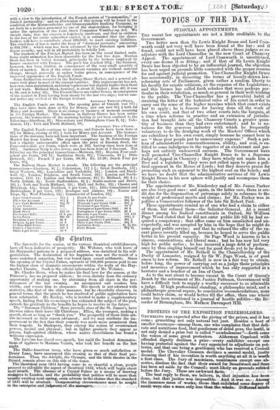TOPICS OF THE DAY.
JUDICIAL APPOINTMENTS.
THE recent law appointments are not a little creditable to the Government.
Two better men than Sir Lewis Knight Bruce and Lord Cran- worth could not very well have been found at the bar ; and if found, could not well have been placed above those judges as co- adjutors with the Lord Chancellor in the new Court of Chancery Appeal. The _appointment of Lord Cranworth is uncriticized, every one deems it so fitting ; and if that of Sir Lewis ESuight Bruce has been objected to by an influential journal, the objection has been urged on grounds little connected with the proper reasons for and against judicial promotion. Vice-Chancellor Knight Bruce ' has occasionally, in dissecting the terms of loosely-drawn law- reforming acts of Parliament, given rather, a random, liberty to his faculty for caustic criticism, at the expense of the'Legislature ; and this licence has called forth rebukes that were perhaps par- ticular in their retaliation, as much as general in their well-wishing to the public. The Vice-Chancellor has a proverbial habit of ' straining the letter of the technical rules of his court in order to carry out the sense of the higher maxims which that court exists but to apply ; he is famous for having done all the work of his own court, and that of two other courts into the bargain, nt a time when reforms in practice and an extension of jurisdic- ' tion had brought into all the Chancery Conrts a greater quan- tity of business than they had ever entertained ; and he is no- ' torious for the generous industry with which he frequently volunteers to do the drudging work of the Masters' Offices which are subsidiary to his own court, simply because he cannot bear to see " these poor people put to unnecessary expense." Such a pat- tern of administrative conscientiousness, ability, and zeal, is en- titled to some indulgence in the vagaries of an exuberant and per- haps not entirely undeserved sarcasm. The Government have well promoted Vice-Chancellor Knight Bruce to be a Supreme Judge of Appeal in Chancery ; they have wisely not made him a Peer and a legislator. They were not called upon to place a poli- tical opponent la the House of Lords ; but they deserve praise for promoting such an opponent to the highest seat on the bench ; and we have no doubt that the administrative services of Sir Lewis Knight Bruce in his new sphere will justify and recompense them for their choice.
The appointments of Mr. IC indersley and of Mr. James Parker are also very good ones : and again, in. the latter cases there is cre- dit due for the dispensation of patronage solely in reference to the weight of professional merits and claims ; for Mr. Parker was in polities a Conservative follower of the late Sir Robert Peel.
These appointments remind us of one who had a claim to either of them, but refused them—the Solicitor-General. At .a recent dinner among his Radical constituents in Oxford, Sir William Page Wood stated that he did not enter public life till he had ac- quired a competency ; that office came on him unsolicited and un- expectedly, and was accepted by him in the hope that he might do some good public service; and that he refused the offer of the va- cant places recently filled up, because he hoped to serve the public better in his present capacity. Sir Page Wood is known to be a sincere, conscientious, and liberal man ; lint he has now bid very high for public notice ; he has incurred Ai:ergo del4 bf perform- ance by thus singling himself out for go_ad .deeds yet to jae Aone. The appointment of Mr. Bethel to the Chancelloralup of the - Duchy of Lancaster, resigned by Sir "i,T.,Page Wood,_ is of good omen to law reform. Mr. Bethel is now in a fair way to obtain, before long, the power of carrying out as a judge those principles and measures of improvement which he has ably supported as a barrister and a bencher of an Inn of Court.
As to the seat about to become vacant in the Court of Queen's Bench by the retirement of Mr. justice Patteson, Government will have a difficult task to supply a worthy successor to so admirable a judge. If high professional standing, a philosophic mind, and a philanthropic general repute, be conclusive recommendations, none could better claim, or would better fill the office, than one whose name has been mentioned in a journal of hostile pOlitics—the Re- corder of Birmingham, Mr. Mathew Davenport 'TM.


























 Previous page
Previous page